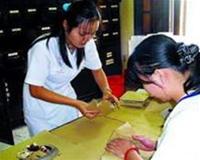When experiencing varying degrees of impotence, many men tend to seek advice and treatment from traditional Chinese medicine (TCM). This is a good habit, as TCM shows many strengths in this field.
 |
| Prescribing treatment for patients at the Traditional Medicine Department of Bach Mai Hospital (Photo: TTO) |
However, it is noteworthy that both practitioners and patients often fall into misconceptions, leading to unfortunate consequences: patients may end up “wasting money and getting no results,” while practitioners risk losing their credibility.
What are these misconceptions?
First is the belief that impotence is solely caused by “kidney deficiency.” For various reasons, when faced with impotence, many patients immediately think that their kidneys are weak and instinctively seek out TCM herbs aimed at tonifying the kidneys and enhancing yang to treat the condition. This belief is further reinforced when they receive advice from genuine “quacks.” From both theoretical and practical perspectives, this notion is fundamentally flawed.
According to traditional Chinese medicine, impotence falls under the category of “yang deficiency,” with complex causes such as emotional distress (psychological and emotional factors), improper diet (unbalanced eating), invasion of external pathogens (factors causing disease from the outside, such as cold and dampness…), excessive sexual activity (irregular sexual practices), advanced age and weakness, long-term illness, and congenital deficiencies (hereditary issues or childhood ailments).
These factors disrupt the functioning of internal organs, directly or indirectly leading to various forms of yang deficiency, including conditions like liver qi stagnation, damp-heat in the liver channel, heart and spleen deficiency, qi stagnation and blood stasis, cold obstructing the liver channel, stress damaging the kidneys, kidney yang deficiency, and yin deficiency with excess heat… Consequently, treatment approaches will differ. For instance, in cases of impotence caused by heart and spleen deficiency (where both the heart and spleen are weakened), treatment must focus on strengthening the spleen, nourishing the heart, calming the mind, and using the classical formula Gui Pi Decoction as the main remedy with modifications.
Clinical observations reveal that many individuals aged 20-40 experience impotence while being otherwise healthy, without any signs of kidney deficiency (as understood in TCM), such as dizziness, back pain, knee weakness, tinnitus, hair loss, etc. The primary causes of impotence in these instances are psychological and emotional factors (emotional distress) primarily affecting organs like the liver, heart, and spleen, resulting in conditions such as liver qi stagnation and heart-spleen deficiency.
Second, is the belief that simply using herbs and formulas that tonify the kidneys and enhance yang can cure impotence, leading to an obsession with such tonifying drugs. This second misconception is a natural consequence of the first. However, it is important to note that while patients lack specialized knowledge and feel confused, some “quacks” and those in the traditional medicine business may inadvertently or deliberately exaggerate the benefits of kidney tonifying herbs, causing patients to misuse them due to misplaced trust.
As a result, the patient’s condition may not only fail to improve but may even worsen, potentially leading to undesirable side effects such as nervous tension, insomnia, mouth ulcers, bleeding gums, boils, dry mouth, and increased blood pressure… For those with impotence due to the use of modern drugs for treating hypertension, coronary artery disease, diabetes, etc., mistakenly using or overusing tonifying medications can be extremely dangerous.
Research indicates that prolonged use of tonifying drugs can inhibit the stimulation of the hypothalamus-pituitary-gonadal axis, which plays a crucial role in enhancing yang. Moreover, the abuse of tonifying medications can lead to rapid enlargement of the prostate in men, significantly increasing the risk of cancer.
Finally, there is the belief that when one suffers from impotence, they should abstain from sexual activity (complete abstinence). While it is true that when the body is weak, reducing sexual activity is necessary to conserve energy and maintain health, except in severe cases of impotence—where one cannot engage in sexual activity—those with mild to moderate impotence should still maintain sexual activity at an appropriate frequency, even if the success rate may be low. This is extremely important as it not only alleviates psychological distress but also provides necessary stimulation for recovery.
Even in severe cases of impotence, without intimacy with the opposite sex or encouragement and affection from a partner, no matter how effective the medication, treatment outcomes will be limited. When there is a desire for sexual activity but no ejaculation for an extended period, it can lead to “sexual inhibition.”
Traditional Chinese medicine posits that engaging in intimate relations can help smooth the flow of emotions, ensuring the free flow of liver qi and balanced heart blood. Prolonged abstinence can lead to disharmony in liver qi, qi and blood stagnation, thereby undermining the goal of health preservation.


















































